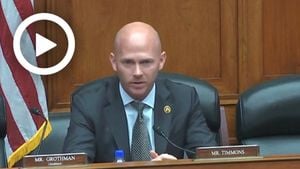Republican Senator John Thune of South Dakota has officially been elected as the new Senate majority leader, marking the conclusion of a significant leadership shakeup within the GOP as the party gears up for its return to majority control following recent elections.
This transition, which took place on November 13, 2024, elevates Thune, 63, from his previous role as party whip to one of the highest positions within the Senate. His election is especially notable considering it occurs alongside the re-emergence of Donald Trump as president. Thune's leadership will be instrumental as the Republicans aim to implement their legislative agenda under the incoming Trump administration.
Thune managed to secure the majority support of his peers, triumphing over fellow senators John Cornyn of Texas and Rick Scott of Florida after several rounds of voting. The election process itself was shrouded in secrecy, with GOP members casting ballots to choose their new leader behind closed doors, reflecting the emphasis on collective decision-making within the party.
Despite some friction with Trump over the years, including public disagreement following the 2020 election, Thune appears ready to align with the former president. He has maintained regular communication with Trump, discussing strategies for pushing his policy plans forward. This newfound camaraderie is pivotal as both face the challenges of uniting the party and addressing the needs of the Senate moving forward.
Thune's victory did not come without challenges. Throughout this year, he actively campaigned for GOP candidates across the country, raising over $31 million to bolster Republican efforts to regain Senate control, including transferring $4 million from his own campaign accounts to the party's main fund.
Known for his ability to effectively communicate and lead, Thune previously served as the chair of the Senate Commerce Committee. His extensive experience, which includes four terms as senator, positions him well to navigate the complex environment of Congress. During the election process, some colleagues viewed him as the front-runner, particularly after stepping up to temporarily lead the GOP during McConnell's medical leave last year.
Meanwhile, John Cornyn, who was Thune's main rival, garnered 24 votes, showcasing his respected standing within party ranks. Cornyn's background as Texas Attorney General and involvement with negotiation on significant issues such as gun legislation highlighted his role as not just a party figure but someone capable of bipartisan reach.
Rick Scott’s campaign, which aimed to position him as Trump's endorsed candidate, did not translate to sufficient majority support to stay competitive after the first ballot. Although he received initial backing from more conservatives within the party, Scott was eliminated after failing to garner the needed votes to advance to the next round.
The selection of the new Senate majority leader signals more than just internal party dynamics; it reflects shifting strategies as the GOP adapts to the political realities of Trump's second presidency. With many senators eager to assert their own agendas, the potential for friction within the Senate's leadership could spark changes to traditional pathways for advancing legislation.
Senators are entering this new leadership era with various ideas for reforming the Senate's operation. Both Thune and Cornyn have pledged to allow more opportunities for individual senators to bring forth bills and contribute to discussions, contrasting the more centralized decision-making approach favored by Mitch McConnell during his tenure as majority leader.
This leadership transition occurs within the broader backdrop of political changes, including record numbers of women expected to serve as governors and heightened focus on various policy areas. The recent election has left Republican senators contemplating how best to cooperate during the upcoming legislative sessions, making this leadership race especially significant.
Thune’s election stands as not just the end of one leadership era but the beginning of another, with his success deeply intertwined with the future direction of the Republican Party. To navigate these uncharted waters, Thune will need to balance the interests of traditional GOP members with the fiery desires of the party's far-right factions, all under the watchful eye of Donald Trump.
With Thune at the helm, the expectation is set high for him to lead the Senate Republicans through the challenges and opportunities on the horizon. His seasoned experience will be put to the test as he manages the dynamics of the Senate and addresses the pressing issues facing his party and the nation.
At the conclusion of the leadership election, Thune expressed gratitude and readiness to take on the mantle of leadership, highlighting his commitment to serve not just the party but the constituents of South Dakota and the broader interests of the American people. His leadership style, which has been described as collaborative and inclusive, will be pivotal to fostering unity within the Republican caucus as they move forward.



